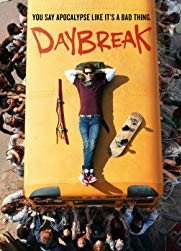The Hilarious, Unorthodox Storytelling in Netflix’s “Daybreak”

November 8, 2019
Based on a comic series written and illustrated by Brian Ralph, “Daybreak” was released on Oct. 24 as a ten-episode coming-of-age Netflix series with a dystopian twist.
Set in Glendale, Los Angeles, in the aftermath of a nuclear war, “Daybreak” follows Josh Wheeler, a teenager trying to survive a chaotic, post-apocalyptic world with adults turned zombies, bloodthirsty, stereotypical tribes of high schoolers, and a serial kidnapping cannibal. Living in solitude, his goal for the past few months has been searching for his girlfriend, Sam Dean, who he was separated from when bombs began to rain from the sky. Throughout the series, Josh finds companionship in football player turned pacifist modern samurai, Wesley Fists, and sociopathic, genius middle-schooler, Angelica Green. These allies face countless outlandish trials, like escaping narrow death at the hands of a tribe of Mad Max-style jocks. Somehow through its absolutely chaotic, might-as-well-have-lit-the-script-on-fire plot, “Daybreak” evokes heartfelt moments of morality and friendship while insightfully acknowledging current social issues.
Although at first glance, “Daybreak” appears to be a simple, some-what stupid dystopian romance, the show quickly morphs into a profound satirical comedy that uses a facade of simplicity to brutally stomp on Hollywood tropes, defy genres, and comment on the social environment surrounding today’s youth. This show reeled me in with its absurd, dystopian twist on a romantic comedy and held me captivated with its brilliant, intellectual musings on issues in society. For those who can appreciate “Daybreak”’s unique storytelling, this show is a must-watch and a guaranteed re-watch.
One of the reasons I fell in love with “Daybreak” was because of its witty meta-comedy. It is a comedy associated closely with current teenagers, one filled with sarcasm, irony, stupidity, obscure pop culture references, character self-awareness, and the diminishing of serious problems, and it varies widely. For example, the fact that the members of the golf team are named, Terry, Berry, Jerry, Larry, and Gary is laughably simple. However, there is also a first-generation Armenian-American impersonating I.C.E. and an episode narrated in a dramatic, warrior’s journey style by RZA of the Wu-Tang Clan. This unpredictable humor, which filled every episode of “Daybreak,” kept me engaged and hoping for more while simultaneously never knowing what to expect.
As for the trope-stomping, “Daybreak” deserves a round of applause for normalizing diversity and obliterating media stereotypes. Notably, a subplot of the show is the story of two homosexual football players. Their romance is complex, consistently developed, and never downplayed or reduced to the usual, media stereotypes of gay relationships. Not to mention that the cheerleaders are powerful, intelligent feminists with three diverse women as their leaders.
My favorite part of the show, however, was its satirical commentary.
SPOILER ALERT: the moment that really messed with me was when it was revealed that the HPV vaccine was the factor that protected mostly only teenagers from the biological bomb, and the aforementioned cannibal, an advocator of the vaccine, began to view himself as the savior of the teenagers of Glendale. He monologues about his purpose as some messiah with a Napoleonic twist, and many, many wires crossed uncomfortably with our reality. I have never been as terrified or as aware of the practical possibilities of this post-apocalyptic world as I was at that moment.
“Daybreak,” though a far cry from reality, acknowledges everything from nuclear warfare and the future of humanity to divine superiority and the natural state of humans with an eerie undertone uncomfortably close to our current social environment. It is unworldly how the directors and writers squeezed these deep subjects in between chopped off appendages and characters descending into madness, but it worked in the show’s own disturbing manner.
Although “Daybreak” is intriguing to me, I also see it as a niche show and certainly one to keep away from anyone weak of heart or mind. However, to the people who enjoy the thrill of a bloody, unpredictable apocalypse or to those like myself who can stomach the gore to appreciate the savage comedic and satirical genius of the show, I am certain you will never find any show that can blow your mind quite like “Daybreak.”


